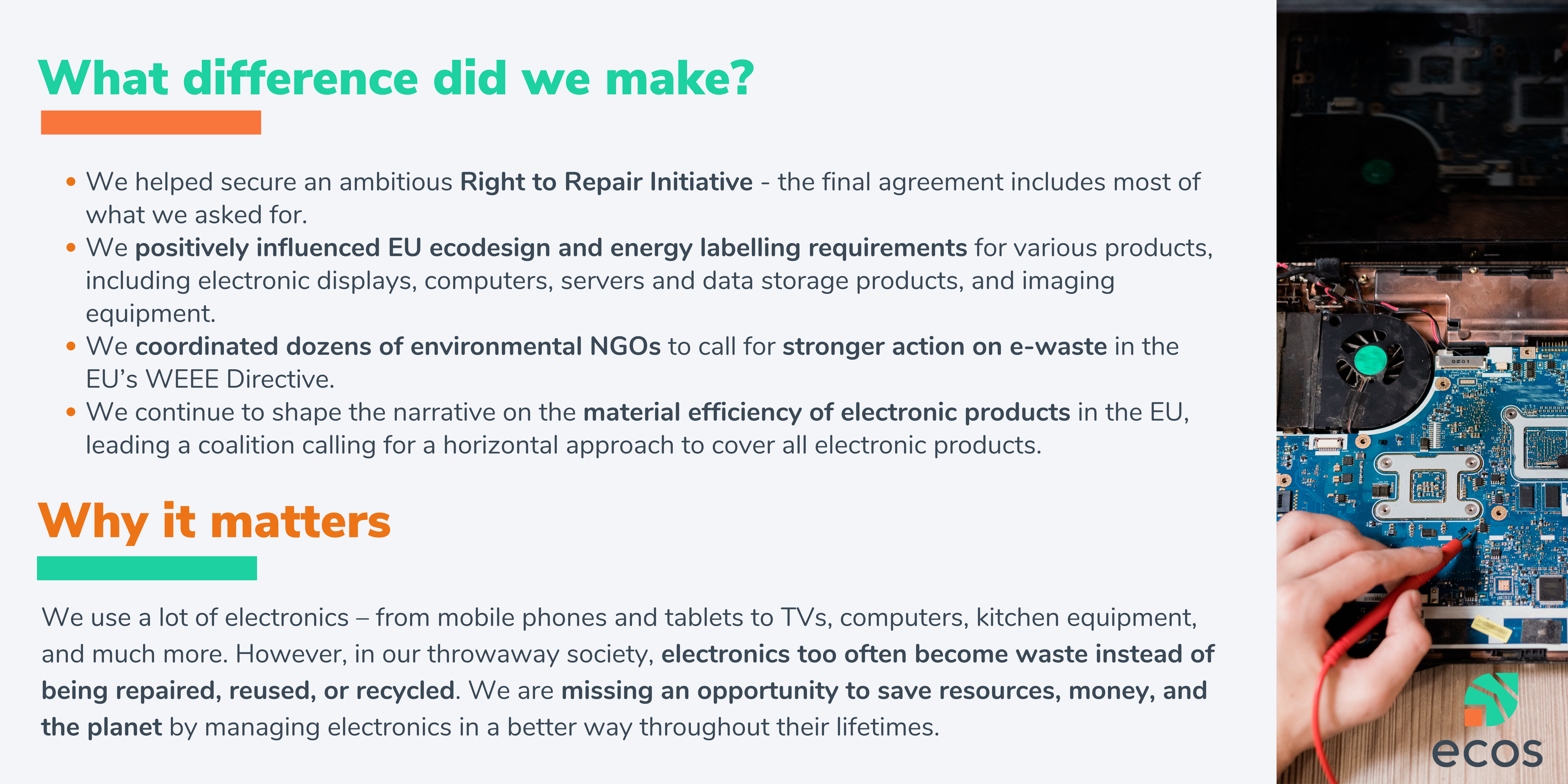Better electronics will be a big win for the environment
Our lives and homes are full of electronic products – much of which eventually becomes waste that has never been properly recycled. To limit the growing impact of electronic products, they must become cheaper and easier to repair, reuse, and, eventually, recycle. Building on our longstanding efforts, ECOS helped shape a greener future for electronics in 2023. From international e-waste standards to updated EU rules on sustainable product design, waste management, and the right to repair – we restated our call for better, greener electronics.

E-waste – a growing problem with impactful solutions
Every year, demand for electronics is growing – with the number of appliances on the market rising by more than 85% between 2013-2021. For a society that revolves around the use of electronic products, we are exceptionally bad at managing their impacts. Only 17.4% of e-waste reaches recycling facilities or is appropriately managed (source: GESP). The rest is poorly (or even illegally) handled, with much of it dumped in low or middle-income countries, triggering conflicts, human rights abuse, chemical pollution, and environmental degradation.
Such impacts begin even before a product is made, with masses of raw materials extracted for use in electronics. In 2021, 571 million tonnes of materials were displaced – the weight of 9.20 billion humans – to manufacture our digital devices and use their associated services in the EU27+UK alone (source: GreenIT).
Improving the production, use, and disposal of electronics – even in small ways – has a huge impact on the environment. Proper disposal of the aforementioned 17.4% of e-waste prevented the release of an estimated 15 million tonnes of carbon dioxide (source: WHO). In the EU, integrating durability and repairability into ecodesign requirements for energy-related products could save the same amount of energy as unplugging 412 million televisions (source: European Commission). Every action matters.
Our work moves the dial from throwaway culture to sustainability
Shifting to a culture of maintenance and reuse rather than waste would help us to use fewer resources and energy when manufacturing new products because wasteful purchases should slow down. This would have a knock-on effect on the amount of e-waste we generate, which would also slow – as would the conflicts and human rights abuses triggered by resource extraction and the mismanagement of e-waste.
Consumers will benefit from the better management of electronics, too. Products will last longer and repairing them will become cheaper and easier. In turn, this will create jobs in the repair, reuse, and recycling industries, boosting economic growth – not to mention the money saved by preventing the disposal of raw materials, which currently leads to an annual loss of US$57 billion (source: Ernst & Young).
How ECOS makes electronics better for the environment
2023 was a busy year during which we enhanced our longstanding work on electronics. We influenced and shaped the narrative on the material efficiency of electronic products, the right to repair, energy efficiency, and e-waste. We helped shape a new international standard on the sustainable management of e-waste. Our work resulted in an environmentally ambitious standard, which implements the waste hierarchy by focusing on the recovery of products, components, and materials. Due to be introduced in 2024, it will help to set the direction of travel for better management of e-waste globally.
Through our work in the Global Electronic Council, we have also contributed to updating the EPEAT label, which helps consumers and procurers to identify the most sustainable ICT products on the market. We pushed to add and reinforce material efficiency requirements, which in practice means more repairable, reusable and recyclable products.
In 2023, we also continued positively influencing EU ecodesign and energy labelling requirements for various products, including electronic displays, computers, servers and data storage products, and imaging equipment (such as printers and cartridges). Discussions on how to design these products sustainably will continue into 2024, and we will keep to raising our voice for the environment at every opportunity.
We cannot do it alone; alongside partners, our voice is louder, and we have more impact. When we called for a horizontal approach to product design at EU level, we coordinated a reaction from over 30 other like-minded organisations. And when we demanded that the EU take stronger action to combat e-waste in the WEEE Directive, we did so with 27 environmental NGOs.
As co-founder and co-leader of the Right to Repair Europe coalition, ECOS helped to secure a strong European Parliament position on the Right to Repair Initiative, with an almost unanimous vote for a text that included most of our recommendations, including a more reasonable price for spare parts and rules against software practices limiting repair activities. This position was largely safeguarded in the final agreement reached between the European Parliament and the Member States on this Directive.
The Right to Repair Europe coalition has had a very successful year, during which it has grown its influence, with a deep dive profile in the Financial Times and being voted a top designer of the year in The Guardian. With the EU’s Right to Repair Initiative due to be voted in 2024, we will build on these foundations to protect the environment and the rights of consumers.
What comes next?
We want electronic products to be easier and cheaper to repair, reuse and recycle. In a society so reliant on electronics, this cannot be avoided. We also want new rules to ensure that products are designed in a way that is better for the environment – whether those rules are horizontal or applied to individual products.
In 2024, ECOS will continue to influence legislation and standards related to the production, use, and disposal of electronic products. Every step forward will be a big win for the environment. 2024 will bring many opportunities – let’s ensure our policymakers and standardisers don’t miss them.


